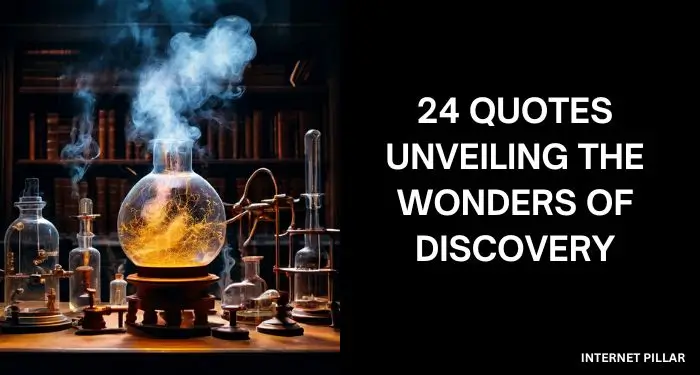The pursuit of scientific knowledge has been a driving force behind human progress for centuries.
From the groundbreaking discoveries of ancient philosophers to the cutting-edge research of modern-day scientists, the quest to understand our world and universe continues to inspire and amaze.
In this collection of 24 thought-provoking quotes, we’ll explore the wisdom, curiosity and passion that fuel scientific discovery.

These insights from some of history’s greatest minds offer a glimpse into the wonder and excitement that comes with unraveling the mysteries of our existence.
Let’s get started.
1. “Everything is theoretically impossible, until it is done.” – Robert A. Heinlein

This quote, although from a science fiction author, captures the essence of scientific progress.
It reminds us that many of today’s realities were once thought impossible.
Scientists and innovators constantly push the boundaries of what’s possible, turning theoretical concepts into practical applications.
This mindset of perseverance and imagination is crucial for advancing human knowledge and capabilities.
2. “Science and everyday life cannot and should not be separated.” – Rosalind Franklin
Rosalind Franklin’s words emphasize the integral role of science in our daily lives.
Too often, we view science as something distant or confined to laboratories.
However, scientific principles underpin everything from the technology we use to the food we eat.
Recognizing this connection can foster a greater appreciation for scientific research and its impact on society.
3. “All outstanding work, in art as well as in science, results from immense zeal applied to a great idea.” – Santiago Ramón y Cajal
This insight from the father of modern neuroscience highlights the passion that drives scientific breakthroughs.
Great scientific achievements aren’t just the result of intelligence or resources, but also of dedication and enthusiasm.
It reminds us that the most significant discoveries often come from those who are truly passionate about their work.
4. “If you know you are on the right track, if you have this inner knowledge, then nobody can turn you off… no matter what they say.” – Barbara McClintock
McClintock’s words speak to the importance of self-confidence and perseverance in scientific pursuits.
Often, groundbreaking ideas face skepticism or rejection from the scientific community.
This quote encourages researchers to trust their instincts and continue their work, even in the face of doubt or criticism.
5. “Above all, don’t fear difficult moments. The best comes from them.” – Rita Levi-Montalcini
This quote from Nobel laureate Rita Levi-Montalcini reminds us that challenges and setbacks are an integral part of scientific progress.
Instead of fearing difficulties, we should embrace them as opportunities for growth and discovery.
Some of the most significant breakthroughs in science have come from overcoming seemingly insurmountable obstacles.
6. “Research is to see what everybody else has seen and to think what nobody else has thought.” – Albert Szent-Györgyi
Szent-Györgyi’s words capture the essence of scientific innovation.
It’s not just about observing or collecting data, but about interpreting that information in new and creative ways.
This quote encourages scientists to look beyond the obvious and seek novel connections and explanations for observed phenomena.
7. “If you want to have good ideas, you must have many ideas.” – Linus Pauling
Pauling’s quote emphasizes the importance of creativity and brainstorming in scientific research. It suggests that quantity can lead to quality when it comes to ideas.
By generating numerous hypotheses or approaches, scientists increase their chances of stumbling upon truly innovative solutions to complex problems.
8. “We are just an advanced breed of monkeys on a minor planet of a very average star. But we can understand the Universe. That makes us something very special.” – Stephen Hawking
This humbling yet inspiring quote from Stephen Hawking puts our place in the cosmos into perspective while celebrating human intelligence.
It reminds us of the remarkable feat of comprehending the vast and complex universe despite our seemingly insignificant position within it.
This understanding should motivate us to continue exploring and learning.
9. “Nothing in life is to be feared, it is only to be understood. Now is the time to understand more, so that we may fear less.” – Marie Curie
Marie Curie’s words encourage us to approach the unknown with curiosity rather than fear.
This mindset is crucial in scientific endeavors, where researchers often venture into uncharted territories.
By seeking to understand rather than shying away from the unfamiliar, we can overcome our fears and expand our knowledge.
10. “Science knows no country, because knowledge belongs to humanity and is the torch which illuminates the world.” – Louis Pasteur
Pasteur’s quote highlights the universal nature of scientific knowledge. It reminds us that science transcends national boundaries and cultural differences.
This perspective encourages international collaboration and the free exchange of ideas, which are crucial for addressing global challenges and advancing human understanding.
11. “When kids look up to great scientists the way they do musicians, actors [and sports figures], civilization will jump to the next level.” – Brian Greene
Greene’s statement underscores the importance of elevating scientists as role models in society.
By inspiring young people to pursue careers in science and fostering a culture that values scientific achievement, we can accelerate progress and innovation.
This shift in societal values could lead to more resources and talent being directed towards scientific endeavors.
12. “The important thing is to never stop questioning [or learning].” – Albert Einstein
Einstein‘s words remind us that curiosity and lifelong learning are at the heart of scientific progress.
The most successful scientists maintain a sense of wonder and a willingness to challenge existing knowledge.
This attitude of continuous questioning and learning is essential for pushing the boundaries of human understanding.
13. “We cannot solve problems with the same thinking we used to create them.” – Albert Einstein
This quote emphasizes the need for innovative and creative approaches to problem-solving.
It suggests that addressing complex scientific and societal challenges often requires a shift in perspective or the development of entirely new paradigms.
This mindset is crucial for overcoming seemingly intractable problems and making breakthrough discoveries.
14. “You cannot teach a man anything; you can only help him discover it in himself.” – Galileo
Galileo’s insight speaks to the nature of learning and discovery in science.
It suggests that true understanding comes not from passive reception of information, but from active engagement and personal realization.
This philosophy encourages hands-on experimentation and critical thinking in scientific education and research.
15. “It is strange that only extraordinary men make the discoveries, which later appear so easy and simple.” – Georg C. Lichtenberg
Lichtenberg’s observation highlights the deceptive simplicity of many scientific breakthroughs.
What seems obvious in hindsight often requires exceptional insight and creativity to discover.
This quote reminds us to appreciate the ingenuity behind scientific advancements and not to take them for granted.
16. “Falsity in intellectual action is intellectual immorality.” – Thomas Chrowder Chamberlin
Chamberlin’s words underscore the importance of intellectual honesty in scientific pursuits.
This quote emphasizes the ethical responsibility of scientists to pursue truth objectively and report findings accurately.
It reminds us that the integrity of the scientific process is crucial for maintaining public trust and advancing knowledge.
17. “The aim of science is to discover and illuminate truth.” – Rachel Carson
Carson’s statement encapsulates the fundamental purpose of scientific inquiry.
It reminds us that at its core, science is about uncovering truths about the natural world.
This pursuit of truth drives scientific progress and helps us better understand and interact with our environment.
18. “Even for the physicist, the description in plain language will be a criterion of the degree of understanding that has been reached.” – Werner Heisenberg
Heisenberg’s insight highlights the importance of clear communication in science.
It suggests that true understanding is reflected in one’s ability to explain complex concepts simply.
This principle encourages scientists to strive for clarity in their explanations, making scientific knowledge more accessible to both peers and the public.
19. “It is impossible to disassociate language from science…To call forth a concept, a word is needed.” – Antoine Lavoisier
Lavoisier’s quote emphasizes the crucial role of language in scientific thought and communication.
It reminds us that precise terminology and clear expression are essential for conveying scientific concepts and discoveries.
This insight underscores the importance of developing a robust scientific vocabulary and effective communication skills.
20. “Write for a scientist in another field. Don’t underestimate your readers’ intelligence, but don’t overestimate their knowledge of a particular field.” – Julie Ann Miller
Miller’s advice addresses the challenge of communicating scientific ideas across disciplines.
It encourages scientists to find a balance between technical accuracy and accessibility in their writing.
This approach can foster interdisciplinary collaboration and make scientific findings more widely understood and appreciated.
21. “If you cannot – in the long run – tell everyone what you have been doing, your doing has been worthless.” – Erwin Schrödinger
Schrödinger’s statement emphasizes the importance of making scientific work accessible and relevant to the broader public.
It suggests that the value of scientific research lies not just in the discovery itself, but in its ability to be communicated and understood by others.
This perspective encourages scientists to consider the broader implications and applications of their work.
22. “Speculation and the exploration of ideas beyond what we know with certainty are what lead to progress.” – Lisa Randall
Randall’s quote highlights the role of imagination and theoretical exploration in scientific advancement.
It reminds us that progress often comes from venturing beyond the boundaries of established knowledge.
This mindset encourages scientists to pursue bold ideas and hypotheses, even when they challenge conventional wisdom.
23. “The doubter is a true man of science; he doubts only himself and his interpretations, but he believes in science.” – Claude Bernard
Bernard’s words emphasize the importance of self-skepticism and humility in scientific inquiry.
It suggests that a true scientist is always willing to question their own conclusions and interpretations.
This attitude of constant self-evaluation and openness to new evidence is crucial for maintaining scientific integrity and fostering progress.
24. “Science is organized knowledge. Wisdom is organized life.” – Immanuel Kant
Kant‘s quote distinguishes between scientific knowledge and practical wisdom.
It reminds us that while science provides us with organized information about the world, wisdom involves applying that knowledge effectively in our lives.
This perspective encourages us to consider how scientific discoveries can be translated into meaningful improvements in human existence.
Read Also: 45 Science Quotes From Scientists to Inspire You
In conclusion, these 24 quotes offer a glimpse into the minds of some of history’s greatest scientific thinkers.
They remind us of the wonder, challenges and responsibilities that come with scientific discovery.
From the importance of curiosity and perseverance to the need for clear communication and ethical conduct, these insights continue to guide and inspire scientists today.
As we face increasingly complex global challenges, the wisdom encapsulated in these quotes can help us navigate the path forward, reminding us of the power of human ingenuity and the endless possibilities that scientific inquiry presents.




